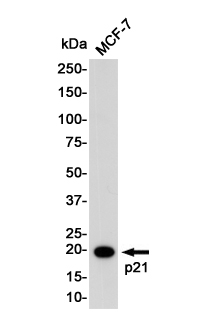
| WB | 1/500-1/1000 | Human,Mouse,Rat |
| IF | 咨询技术 | Human,Mouse,Rat |
| IHC | 咨询技术 | Human,Mouse,Rat |
| ICC | 技术咨询 | Human,Mouse,Rat |
| FCM | 咨询技术 | Human,Mouse,Rat |
| Elisa | 咨询技术 | Human,Mouse,Rat |
| Aliases | CDKN1A; CAP20; CDKN1; CIP1; MDA6; PIC1; SDI1; WAF1; Cyclin-dependent kinase inhibitor 1; CDK-interacting protein 1; Melanoma differentiation-associated protein 6; MDA-6; p21 |
| Entrez GeneID | 1026 |
| WB Predicted band size | Calculated MW: 18 kDa; Observed MW: 21 kDa |
| Host/Isotype | Rabbit IgG |
| Antibody Type | Primary antibody |
| Storage | Store at 4°C short term. Aliquot and store at -20°C long term. Avoid freeze/thaw cycles. |
| Species Reactivity | Human,Mouse |
| Immunogen | A synthetic peptide of human p21 |
| Formulation | Purified antibody in TBS with 0.05% sodium azide,0.05%BSA and 50% glycerol. |
+ +
以下是3篇关于p21抗体的经典文献概述:
1. **文献名称**:Inhibition of cyclin-dependent kinases by p21
**作者**:Harper, J. W. et al.
**摘要**:该研究首次阐明p21蛋白通过结合并抑制CDK(细胞周期蛋白依赖性激酶)复合物,调控细胞周期G1/S期转换,实验中利用特异性抗体验证了p21与CDK的相互作用。
2. **文献名称**:WAF1. a potential mediator of p53 tumor suppression
**作者**:El-Deiry, W. S. et al.
**摘要**:报道p21/WAF1是p53下游靶基因,其表达受DNA损伤诱导。通过抗体检测发现p21在p53依赖的细胞周期阻滞中起核心作用,为癌症治疗提供分子机制依据。
3. **文献名称**:Regulation of p21 by mammalian target of rapamycin
**作者**:Brugarolas, J. et al.
**摘要**:研究mTOR信号通路对p21表达的调控,利用p21抗体进行Western blot分析,揭示营养信号通过mTOR影响细胞周期进程的新机制。
4. **文献名称**:The contradictory roles of p21 in apoptosis
**作者**:Gartel, A. L. et al.
**摘要**:综述p21在细胞凋亡中的双重作用,包含其实验方法(如抗体介导的敲低实验),强调p21表达水平差异导致促存活或促凋亡的不同生物学效应。
The p21 antibody is a crucial tool in molecular and cellular biology research, targeting the p21 protein (also known as CDKN1A or cyclin-dependent kinase inhibitor 1A). p21 is a key regulator of cell cycle progression, primarily acting as an inhibitor of cyclin-dependent kinases (CDKs). It mediates cell cycle arrest at the G1/S phase by binding to CDK complexes, thereby blocking their interaction with cyclins. This function is tightly regulated by the tumor suppressor p53. which induces p21 expression in response to DNA damage or cellular stress, allowing cells to repair genetic errors before replication. Dysregulation of p21 is linked to cancer development, aging, and other diseases.
p21 antibodies are widely used in techniques like Western blotting, immunohistochemistry (IHC), and immunofluorescence to detect p21 protein levels, localization, and interactions in various biological samples. Researchers employ these antibodies to study cell cycle dynamics, DNA damage responses, senescence, and cancer mechanisms. Commercial p21 antibodies are available in monoclonal or polyclonal forms, often validated for specificity across human, mouse, and rat models. Selection depends on experimental needs, including species reactivity, application compatibility, and detection sensitivity. Proper controls (e.g., knockout samples) are essential to confirm antibody specificity due to potential cross-reactivity with related proteins.
×